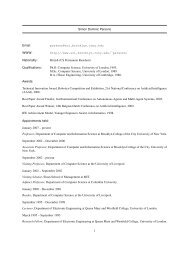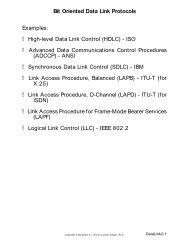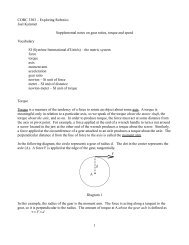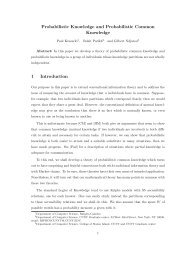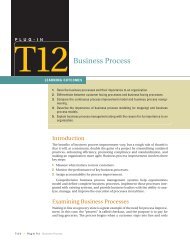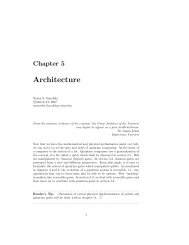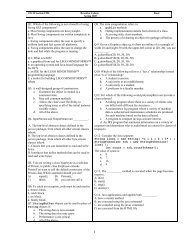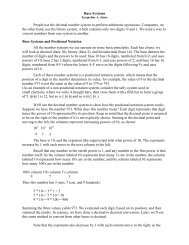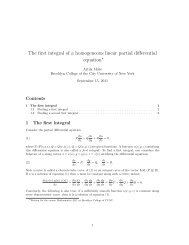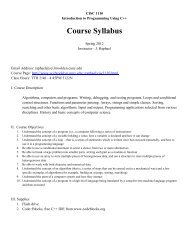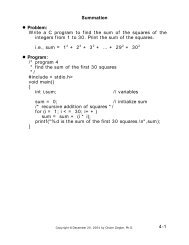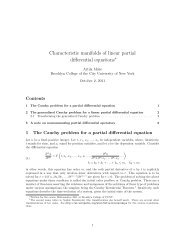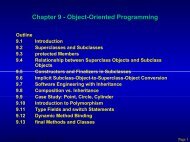*302 Greig and Others v Insole and Others 1977 G. No. 22461977 J ...
*302 Greig and Others v Insole and Others 1977 G. No. 22461977 J ...
*302 Greig and Others v Insole and Others 1977 G. No. 22461977 J ...
Create successful ePaper yourself
Turn your PDF publications into a flip-book with our unique Google optimized e-Paper software.
[1978] 1 W.L.R. 302 Page 9<br />
[1978] 1 W.L.R. 302 [1978] 3 All E.R. 449 (1978) 122 S.J. 162 [1978] 1 W.L.R. 302 [1978] 3 All E.R. 449 (1978)<br />
122 S.J. 162<br />
(Cite as: [1978] 1 W.L.R. 302)<br />
The structure <strong>and</strong> finances of cricket in the Testplaying<br />
countries are thus vulnerable, in the sense<br />
that they are dependent to a considerable degree on<br />
the continued popular attraction <strong>and</strong> profitability of<br />
Test Matches. Anything which is likely to prejudice<br />
such attraction or profitability must be of concern<br />
to those organising cricket in those countries.<br />
The very size of the profits which can be made out<br />
of cricket matches involving star players, however,<br />
must for some years have carried with it the risk<br />
that a private promoter would appear on the scene<br />
<strong>and</strong> seek to make money by promoting cricket<br />
matches involving world-class cricketers. The risk<br />
might perhaps have been a more limited one, if the<br />
structure of official cricket in the Test-playing<br />
countries had been such as to offer the most talented<br />
cricketers a secure <strong>and</strong> remunerative career<br />
structure. In this event, a private promoter might<br />
perhaps have had few attractions to present to those<br />
used to playing in conventionally organised cricket.<br />
In a world situation, however, where no country<br />
save the United Kingdom offers any real career<br />
structure for an aspiring professional cricketer, <strong>and</strong><br />
the United Kingdom itself only offers rewards<br />
which many professional cricketers have considered<br />
inadequate, the path open to an aspiring<br />
commercial promoter of cricket is a much easier<br />
one. It is perhaps surprising that, so far as the evidence<br />
shows, until the beginning of <strong>1977</strong> there had<br />
never appeared any private promoter of cricket<br />
matches who offered any real challenge to the conventional<br />
structure of first class cricket. Nevertheless,<br />
against the background which I have described<br />
from a bird's eye viewpoint, such a challenge to the<br />
conventional structure of cricket headed by the ICC<br />
was bound to come sooner rather than later, <strong>and</strong><br />
this was what actually happened in the early<br />
months of <strong>1977</strong>.<br />
During the period January to April <strong>1977</strong>,<br />
World Series Cricket engaged some 34 of the<br />
world's leading cricketers (including four from<br />
Engl<strong>and</strong>, four from South Africa, four from the<br />
West Indies, four from Pakistan <strong>and</strong> 18 from Australia)<br />
under contracts which bound or purported to<br />
bind these players to make themselves available to<br />
play in a series of matches, described in the contracts<br />
as “test matches,” to be organised by the<br />
company *311 in Australia <strong>and</strong> possibly<br />
elsewhere. The duration of the contracts varied<br />
from one to three years (or in one case five<br />
years). They were entered into in conditions of<br />
secrecy, so as to facilitate recruitment. The news,<br />
however, became public on May 9 <strong>and</strong> caused great<br />
consternation among the governing bodies for<br />
cricket of all the Test-playing countries. <strong>No</strong> one<br />
could reasonably be surprised at such consternation<br />
in the circumstances which have been summarised.<br />
The decision for the court, however, will be whether<br />
the particular steps which the ICC <strong>and</strong> TCCB<br />
took in order to deal with the situation were justifiable<br />
in law.<br />
Briefly, the steps taken were the following. On July<br />
26, the ICC, after anxious <strong>and</strong> protracted consideration,<br />
passed a resolution changing its rules relating<br />
to qualifications for Test Matches. The effect of<br />
this change was that any player who, after October<br />
1, <strong>1977</strong>, should play or make himself available to<br />
play in a match previously disapproved by the ICC<br />
should thereafter be disqualified from playing in<br />
any Test Match without the express consent of the<br />
ICC, such consent to be given only on the application<br />
of the governing body for cricket of the player's<br />
country. The ICC then proceeded to pass a resolution<br />
specifically disapproving for the purpose of<br />
its rules, inter alia, any match arranged or to be arranged<br />
by World Series Cricket to take place in<br />
Australia or elsewhere between October 1, <strong>1977</strong>,<br />
<strong>and</strong> March 31, 1979. One of the effects of this disapproval,<br />
coupled with the previous change of rule,<br />
if valid, would thus be to disqualify from Test<br />
cricket any cricketer, such as the individual<br />
plaintiffs in these actions, who might after October<br />
1, <strong>1977</strong>, carry out his contract with World Series<br />
Cricket by playing in a match arranged by it during<br />
the period October 1, <strong>1977</strong>, to March 31, 1979. Finally,<br />
at its meeting on July 26, the ICC passed a<br />
resolution strongly recommending that each mem-<br />
© 2011 Thomson Reuters.



